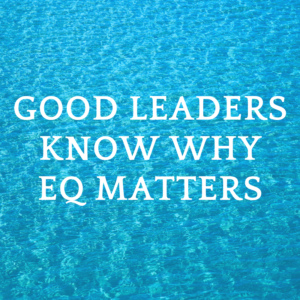 Which is more important for a leader, EQ or IQ? According to Daniel Goleman’s “What Makes a Leader – Why EQ Matters,” they are both equally important but in very different ways. A leader needs to be smart and have reasoned approaches to the direction their organization is headed. In other words, they have a very good “why” behind their business strategy. Research, data, and evidence behind every strategic decision should give the employees some confidence that the leader knows what she or he is doing. This is the IQ part.
Which is more important for a leader, EQ or IQ? According to Daniel Goleman’s “What Makes a Leader – Why EQ Matters,” they are both equally important but in very different ways. A leader needs to be smart and have reasoned approaches to the direction their organization is headed. In other words, they have a very good “why” behind their business strategy. Research, data, and evidence behind every strategic decision should give the employees some confidence that the leader knows what she or he is doing. This is the IQ part.
The emotional intelligence part, or EQ, is the way in which the leader engages the rest of the team to implement the strategy. Without this, the best strategies built with the highest IQ’s are dead in the water. This is the “why” we should do something the way the strategy is calling for. Good leaders know that “WIIFM” (What’s In It For Me) is paramount to explaining why everyone should line up behind a particular strategy. The leader who leads with “how smart they are” first, will step all over the “why” of the strategy and will turn around to find no one following.
Ever been in the presence of someone brilliant and you were energized by the ideas they were talking about and couldn’t wait to get started? Then the person to the left or right says “yeah, but they’re a real jerk?” It has a way of putting a pretty big damper on that enthusiasm. High IQ, low EQ. In order to enable the ideas to gain traction, EQ is required. Good EQ starts with knowing yourself first, what you do well and do not do well. Sharing the responsibility or delegating those things that are not in your wheelhouse and engaging others to help get the strategy over the line are critical. It’s why those very socially awkward leaders – either belligerent, egotistical or shy – never get talked about without the asterisk behind their names. There’s a “but” to their brilliance. Some are willing to put up with the “but” to be in the presence of greatness, but most would like both EQ and IQ combined for an implementable brilliance.
Leaders who don’t explain things because the staff is “too stupid” to understand, fall in this category. As if giving them a little catnip at the completion of a task will be good enough to get it over the finish line. It won’t. People want to be engaged, appreciated and listened to before they buy into a leader’s plan. Even if you think of yourself as the smartest person in the room, it won’t matter if you need others to make whatever you came up with happen.
Create strategies with IQ, implement them with EQ. Without the first, you will have implemented a bad plan, without the latter, no plan at all will be implemented.
